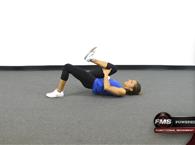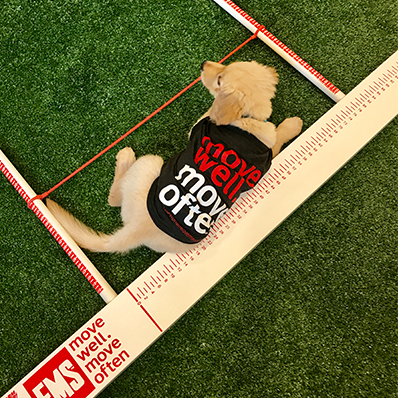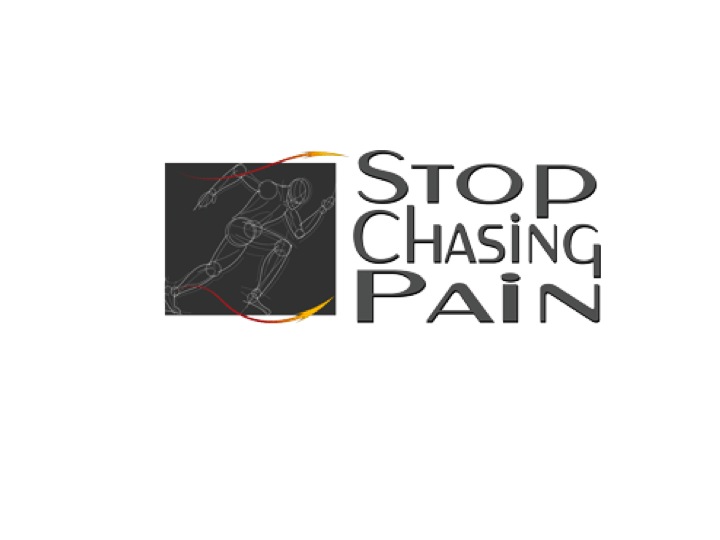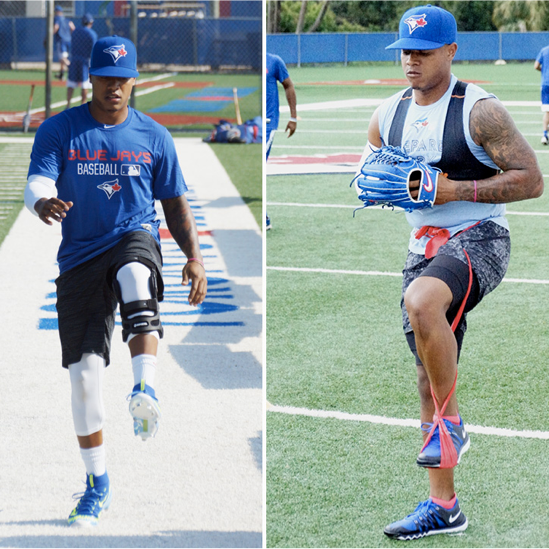Earning The Right: Sending the Right Message to Your Lifters
Written by Tony Gracia FMS
By Tony Gracia, Industrial Strength Gym
Our gym has been open for a few years now, and over that time we’ve had quite the variety of people come through our doors to train. We see everyone from total novices who had never set foot into a gym, all the way up to collegiate and professional athletes, and of course many folks with experience levels somewhere in between. One great thing about being able to work with a total novice is that they don’t typically come with bad habits or unrealistic expectations that we need to address – they are a blank slate. On the flip side, when we get folks who are coming to us from another gym, we often get a mix of good and bad.
One of the primary challenges we run into with transplants is a difference of opinion between our coaching staff and the lifter (and/or their previous coaching staff) about what this lifter is prepared/qualified to do. We have to imagine we are not the only gym that runs into similar situations, which makes us anticipate that some of you reading this will be able to relate. Hopefully this will offer some perspective about where we are coming from and how/why we choose to go about things the way that we do.
The last thing we would ever want is for someone to join our gym, eager and excited to start getting stronger and more fit, only to wind up getting hurt in a preventable situation. Obviously not all injuries are preventable, but we do believe that many are simply by taking the right steps ahead of time. For this reason, one thing we do at Industrial Strength is qualify lifters to be able to participate in certain classes based on the primary exercises programmed into said classes. Depending on which class we are looking at, this qualification process may include some combination of baseline mobility, technical proficiency at certain lifts, and specific strength & fitness minimums. Of course, we do have some classes that are absolutely scalable to almost any fitness level from novice to advanced, and those are open to all interested parties. However, we also have to respect that certain things are not easy or realistic to scale, hence the qualification processes in some cases.
To best explain this, we’ll use a specific example. One class we offer is weightlifting (often incorrectly called “Olympic Lifting” by many). The sport of weightlifting, i.e. the snatch and clean & jerk, has one of the highest barriers to entry of almost any sport as far as the mobility, stability, and coordination needed to even get into the static positions of the lifts. However, due to the sport’s fast-rising popularity, we get quite a number of people who want to train weightlifting with us, many of whom simply don’t yet move well enough to get into the positions needed for the lifts, let alone do them with speed and/or weight.
Now imagine this: we get a person new to our gym that wants to get into weightlifting, and our coaching staff finds this person is not yet able to military press the empty bar, perform a squat to parallel with the empty bar, or perform a deadlift from the floor with a neutral spine. Should we allow this person to join weightlifting right off the bat? Common sense says of course not, they are ill-prepared and need to put in some work on basic mobility and strength first. However, telling this to the lifter is not as easy as one might think, because at their previous gym they were allowed, and even ENCOURAGED, to participate in weightlifting. This puts us in a challenging position where we need to communicate to the lifter our belief that they’re not ready for weightlifting quite yet, and we suggest they do some preparatory work to get there; but we need to have this conversation with a soft enough touch so as not to come across as if we’re grandstanding and/or badmouthing their previous coach, whom the lifter probably has a positive relationship with and thinks highly of.
Weightlifting is just one example of similar situations. We’ve had people come in who told us they deadlifted “X” amount of weight at their old gym, then once we start watching them lift we cut them off at 60% of that figure because that is about all they can do without slipping into significant spine flexion (for those not familiar, this comes with a high risk of lower back injury). Predictably, barbell squats are another one, where we hear things like, “At my old gym I squatted X” and then what our coaches see is at best a half squat, and many times we have to invest time with this person goblet squatting and doing some mobility work just to get them to parallel before we re-introduce the barbell again.
Again, situations like this are challenging to deal with in a way that lets everyone come out ahead. Don’t get us wrong, we will always stop someone if/when we see an unfavorable risk/reward ratio, but that doesn’t mean these conversations are easy to have. As the reader, do a mental experiment and put yourself in the position of one of these lifters. You’ve spent two, maybe three years training at a certain gym under their coaching staff, and you’re proud of the progress you’ve made over that time. Then, for some reason or another you need to find a new gym – maybe your old gym closed, or you accepted a new job and had to move – regardless, you are now on the hunt for a new place to train. After some searching, you find a place you think will be a good fit and decide to give it a shot. You come in for your first training session there and it’s deadlift day. You plan on working up to “X” amount of weight since that is what you used to do at your old gym – but the coach intervenes when you’re barely over half way there and says they are worried about your back. Even after trying out a few cues/corrections, the coach still says they’d like you to not go heavier because they’re worried about you hurting your back due to poor form. How would this make you feel? On one hand, you’d probably appreciate that the coaches are watching closely and want to make sure you’re doing it right. On the other hand though, you’d probably feel confused, frustrated, and maybe even embarrassed … you thought you’d been doing it “right” for years now. If years had gone by and nobody at your old gym had offered suggestions/corrections, then you must have been doing it right … right? Could you actually have been doing it wrong for all those years? Were your old coaches just not paying attention? Or maybe these new coaches at this new place just don’t know what they’re talking about, and you’re actually dong it fine? Your old coaches were really nice, so maybe it’s these new coaches who are off the mark. Who can you trust?
Needless to say, if you were the lifter this is not a position you’d like to be put in, and as coaches we should work together to minimize the number of people who have experiences like this. This sort of thing tends to not leave the lifter with a positive impression of either gym, and more often than not leaves them discouraged and possibly not even wanting to continue training.
So this begs the question, as coaches and gym owners, what can we do to minimize these occurrences and create better experiences for lifters? This is a big question, and we do not pretend to have all the answers to it. However, we do have a few suggestions that our coaching staff has been able to implement successfully.
-
Determine what are the primary movements/lifts in each of your classes, and ensure that your entire coaching staff has a clear understanding of what the non-negotiables are for safety in each of those lifts. If someone is unable to perform a lift to the standards you have, your staff should all be on the same page about what other modifications or alternatives are available. Also, have a plan in place for how you communicate this with the lifter – nobody wants to be the only person doing some other lift compared to the rest of the class, so be considerate of this and explain to the person what you saw that makes you think a modification is the right course of action at this time.
-
You and your coaching staff need to identify what lifts/movements do not have a reasonable alternative or modification available to them. If there are several of these that you use regularly in a certain class, it may be a good idea to consider qualifying people for that class rather than making it open to all levels. Going back to the first example of weightlifting (barbell snatch and clean & jerk) these lifts do not really have reasonable alternatives available that will still leave the lifter feeling like they are honestly participating with the class. For example, if someone cannot hold the barbell in the front rack position (front squats, receiving position for cleans) how are they going to genuinely participate in class? If they can not do a full squat unloaded with proper mechanics, how do you expect them to be able to do it under the stresses of speed and load that come with snatches, cleans, front squats and back squats? As a coach, once you have identified these lifts that do not really have a reasonable modification available, it would be a good idea to develop a screening system to use to ensure a lifter has the baseline mobility and strength needed for said movements. As examples, for our kettlebell classes at Industrial Strength we use the Shoulder Mobility and Active Straight Leg Raise assessments from the FMS, as well as all the clearing tests. We want to see scores of at least 2’s on the SM and ASLR, and no pain in any clearing test before we will progress someone into kettlebell classes. For weightlifting the demands are more rigorous, so we use a more robust assessment. We suggest looking into Dr. Quinn Henoch’s book “Weightlifting Movement Assessment & Optimization” to learn more about that.
-
When you get a new lifter at your gym, be sure to communicate expectations from #1 and #2 above, and do so right from the beginning. Every new person at our facility starts with a 1-on-1 session with a coach where we go over all of this, so that everyone is working from the same playbook. An important part of this is to have a plan in place to help progress people who do not yet meet the entrance guidelines for certain classes, and to be able to communicate that effectively. These conversations go much better when the coach can explain “This is what we’re looking for, this is why, here is where we just measured you to be, and here is our plan to get you from where you now are to where you want to be” as compared to just telling them they don’t meet the minimum and not communicating to them that you have a plan to help them progress.
-
The coaching staff has no room to be shy in holding back lifters who are eager to try more weight than their preparedness allows. Training in a group setting has many benefits, but one of the drawbacks that coaches need to be aware of is hyper-competitiveness at the expense of common sense and safety. Competitiveness can be an amazing thing in the right dosage, but there will always be people who try to keep up with the others in class well past the point of their personal strength, fitness, and technique limits … and that is where risk of injury sky-rockets. This is a subtle balancing act, because we obviously want to encourage people to train hard and make progress; but if we’re honest with ourselves we know ego can get the better of all of us from time to time, so as coaches we need to keep an eye on this.
- Paralleling the item above, as a coach make sure you’re doing more than pushing people to the breaking point all the time. Our job should be coaching them to their long-term goals as safely, successfully, and efficiently as we are able to – and nowhere in those criteria does it say they need to be puking in a bucket after every training session. If you make exercise so miserable for them that it becomes something they fear instead of something they look forward to, then you’re having the opposite impact on that person’s life compared to what you should be doing. It will be only a matter of time before they burn out and stop exercising all together, and we don’t think any coach wants that on their conscience. Obviously helping people overcome physical and mental challenges is the nature of what we do as coaches, but there are healthy ways to go about this and there are obnoxious ones – make sure you’re on the right side.
In summary, we are at a point where a culture shift needs to happen in the fitness industry. Some of our biggest challenges are that of entitlement as well as glorification of the PR, and it is time to address these things before they get out of hand. In martial arts, we have a belt/ranking system that makes this easy to understand – white belts do not have the same experience or abilities as black belts, so their training should not look the same. When a new person comes into the gym, it should be common sense that they should not be doing the same things as the people who have been training for many years – they are a gym white belt, it will take them years to get the adaptations and experience of the veteran lifters. While that may sound like common sense, unfortunately it seems as if it is not so common these days.
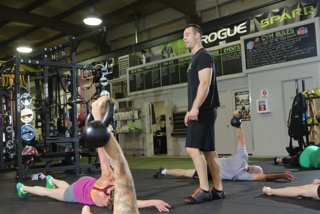 As coaches, we need better communication with our lifters regarding what we expect as far as proper technique, what are the non-negotiables that we have to see them execute, and if they are not at a point yet where that can nail every single non-negotiable, then we must communicate how we will help them get there. In many cases, “getting there” involves not doing the thing they want to do – at least not yet. One saying we love from the FMS is, “You can’t fix the car while you’re driving it.” What this basically means is that if someone needs significant work on their barbell squat, then sometimes the best course of action for them is often not squatting for a period of time, and instead working on the individual components that make up a good squat. Once time has been invested on the individual components, then we can revisit the full pattern, but now with better hardware and a higher likelihood of success. It is amazing how a little time away from the primary lift can actually pay huge dividends in the long run.
As coaches, we need better communication with our lifters regarding what we expect as far as proper technique, what are the non-negotiables that we have to see them execute, and if they are not at a point yet where that can nail every single non-negotiable, then we must communicate how we will help them get there. In many cases, “getting there” involves not doing the thing they want to do – at least not yet. One saying we love from the FMS is, “You can’t fix the car while you’re driving it.” What this basically means is that if someone needs significant work on their barbell squat, then sometimes the best course of action for them is often not squatting for a period of time, and instead working on the individual components that make up a good squat. Once time has been invested on the individual components, then we can revisit the full pattern, but now with better hardware and a higher likelihood of success. It is amazing how a little time away from the primary lift can actually pay huge dividends in the long run.
So, if you are a coach, please do your lifters, yourself, and the entire industry a favor and don’t compromise your non-negotiables. If your lifters start having their knees cave in on squats, address it. If they start displaying a lot of lumbar flexion on deadlifts, work with them on it. If their shoulders come unpacked on presses, make sure they’re aware of it and give them help to improve. Whatever you do, don’t just ignore it and tell them they’re doing fine … this won’t help them, and it certainly won’t help you or anyone else who coaches for a living. Remember, it is perfectly OK to tell someone “no” … as in, “No, you’re not ready for that much weight quite yet,” or possibly, “No, you’re not quite ready for that exercise yet. Keep working hard and you’ll get there soon though.” Obviously your lifters will be at different levels and will have different learning curves, but that is not an excuse to just let things slide.
In closing, what our industry really needs is for more coaches to be willing to say “no” if you genuinely believe that to be in the best interest of the lifter – appeasing them may give them instant gratification, but will almost always come at the expense of their long term success. As a coach, you need to have the conviction to stand your ground on the non-negotiables you and your staff have in place, and not let pressure from your lifters cause to you waiver on what you truly believe to be best for them long term. If lifters start to get a more consistent message from all of us as coaching authorities, it will re-shape our industry in a way that will let everyone come out ahead – and it is up to us to make sure we are sending the right message.
 Tony Gracia is an FMS Certified strength coach, Brazilian Jiu Jitsu black belt and Team Leader for StrongFirst. He and his wife Mira founded Industrial Strength in Portland, Oregon in 2013. He is the head coach of both the strength training and martial arts programs, where they offer classes and private lessons for kettlebells, barbell strength and conditioning, Olympic-style weightlifting, Brazilian jiu jitsu, and kickboxing
Tony Gracia is an FMS Certified strength coach, Brazilian Jiu Jitsu black belt and Team Leader for StrongFirst. He and his wife Mira founded Industrial Strength in Portland, Oregon in 2013. He is the head coach of both the strength training and martial arts programs, where they offer classes and private lessons for kettlebells, barbell strength and conditioning, Olympic-style weightlifting, Brazilian jiu jitsu, and kickboxing
Related Resources
Please login to leave a comment
3 Comments
-
Adam McConnell 11/20/2017 3:19:21 PM
Well said! I feel the same way about the martial arts-style ranking/skill system in many disciplines where skill and/or form are necessary elements of advancement. I've applied and seen it applied to parkour with great success.
-

Shahaf Levin 11/27/2017 2:14:06 PM
"In summary, we are at a point where a culture shift needs to happen in the fitness industry." Yes! That is what I am trying to do with my students, and you made me think about putting in a couple of shifts a week at a commercial gym in order to try and influence some more people.
-
Wendy 3/8/2018 10:31:37 AM
Great stuff. Our gym is constantly running 6 week challenges / bootcamps where participants are put into the same classes as more advanced students. It is difficult to teach these mixed classes, but this article reminds me of the importance of safety and the need to say NO to an over aggressive and less experienced new member. Thank you!

